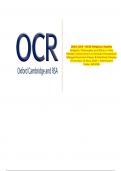2024_OCR - GCSE Religious Studies
Religion, Philosophy and Ethics in the
Modern World from a Christian Perspective
Merged Question Paper & Marking Scheme
(Thursday 16 May 2024 – Afternoon)
Code: J625/06
, Oxford Cambridge and RSA
Thursday 16 May 2024 – Afternoon
GCSE (9–1) Religious Studies
J625/06 Religion, philosophy and ethics in the modern world from
a Christian perspective
Time allowed: 2 hours
* 1 3 9 6 2 0 5 4 6 1 *
No extra materials are needed.
* J 6 2 5 0 6 *
Please write clearly in black ink. Do not write in the barcodes.
Centre number Candidate number
First name(s)
Last name
INSTRUCTIONS
• Use black ink.
• Write your answer to each question in the space provided. If you need extra space use the
lined pages at the end of this booklet. The question numbers must be clearly shown.
• Answer all the questions.
INFORMATION
• The total mark for this paper is 126.
• The marks for each question are shown in brackets [ ].
• Quality of extended response will be assessed in questions marked with an asterisk (*).
• Spelling, punctuation and grammar (SPaG) and the use of specialist terminology will be
assessed in questions marked with a pencil ().
• This document has 20 pages.
ADVICE
• Read each question carefully before you start your answer.
© OCR 2024 [601/8594/6] OCR is an exempt Charity
DC (LK) 332770/5 Turn over
,GCSE (9–1) Religious Studies - J625/06: Religion, Philosophy and Ethics in the Modern World
from a Christian Perspective
The J625/06 Religion, Philosophy and Ethics in the Modern World from a Christian Perspective
exam assesses your understanding of Christian teachings and their application to contemporary issues
in philosophy, ethics, and society. The exam will explore Christian perspectives on a variety of modern
ethical dilemmas, philosophical concepts, and social issues.
Key Topics and Themes:
1. Christian Teachings on Ethical Issues:
Human Rights and Social Justice:
o Christian views on human dignity, equality, and justice, and how these relate to modern
social justice issues.
o The role of the Church in advocating for human rights and fighting inequality, including
Christian responses to issues such as poverty, racism, and gender equality.
Marriage and the Family:
o Christian teachings on the sanctity of marriage and the family unit.
o Christian perspectives on divorce, same-sex marriage, and cohabitation, including
traditional views versus more contemporary interpretations.
Life and Death:
o Christian attitudes towards abortion, euthanasia, and the value of life.
o The concept of the sanctity of life in Christian ethics and how this affects views on
controversial practices.
o Christian views on life after death, including the concepts of heaven, hell, and
resurrection.
2. Christian Ethics in the Modern World:
Environmental Ethics:
o Christian responses to environmental issues such as climate change, conservation, and
stewardship of God's creation.
o The ethical implications of human actions on the planet and how Christian beliefs guide
environmental responsibility.
War and Peace:
o Christian views on pacifism, just war theory, and the morality of violence.
o The role of the Church in promoting peace and resolving conflicts, including Christian
approaches to reconciliation and forgiveness.
Technology and Bioethics:
o Christian perspectives on the ethical implications of modern technology, including
genetic engineering, cloning, and artificial intelligence.
o The relationship between faith and science in addressing contemporary bioethical
issues.
3. Philosophical Concepts in Christianity:
The Existence of God:
o Arguments for and against the existence of God, including the Cosmological,
Teleological, and Moral arguments.
o Christian responses to the problem of evil and suffering in the world, and how faith
relates to the existence of a benevolent God.
The Nature of God:
, o Christian beliefs about the nature of God, including the concepts of the Trinity,
omnipotence, omniscience, and omnipresence.
o How these characteristics of God influence Christian philosophy and ethical thinking.
Faith and Reason:
o The relationship between faith and reason in Christianity, including the role of
scripture, tradition, and personal experience in shaping belief.
o Philosophical debates about the compatibility of faith and reason, particularly in the
context of modern scientific discoveries.
4. Contemporary Christian Responses to Ethical Dilemmas:
Social Media and Christian Ethics:
o The impact of social media on Christian teachings about morality, relationships, and
truth.
o Ethical challenges posed by online behavior, including issues such as cyberbullying,
online pornography, and digital privacy.
Global Issues and Christian Action:
o How Christians respond to global issues such as poverty, migration, and conflict.
o Christian organizations' involvement in global charity work, humanitarian aid, and
activism.
Good luck with your studies and exam preparation!




